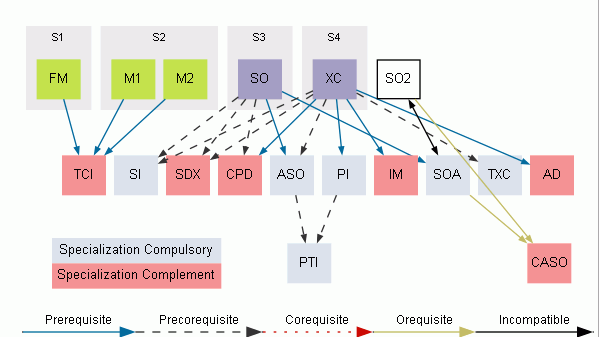Information Technologies
A graduate specialist in Information Technology (IT) will know the necessary technologies, both hardware and software, to store, retrieve, transmit and manipulate data. This means that an IT specialist has a good technical and practical knowledge in managing the technological infrastructure which treats the information and the development of systems. An engineer of IT specializes in integrating information technologies rather than the information itself and has knowledge of hardware, operating systems, programming languages, communication protocols, distributed systems and architectures of systems.
Examples of these concepts include aspects as diverse as can be the design of Internet Service Providers (ISP) and/or IT departments, design of Data Processing Centres (CPD), Big Data infrastructures, administration and design of operating systems, computer security applied to Internet infrastructures and to applications, design of distributed systems and distributed applications, Peer-to-Peer (P2P), Cloud Computing, Grid Computing and Mobile Computing, Web Services, exchange of multimedia content (audio, video), social networks, mobile applications, Internet of things.
Have a look at the briefing of this specialisation:
Career options
Many different professional positions, both in private companies and in public administration, including consultant that design large infrastructures such as ISP or CPD, telecom operators, administration and management of IT departments, integration and maintenance of services and applications in corporate environments, managers of Big Data infrastructures, designers of mobile applications, designers of distributed applications, Web Service developers, experts in computer security, architects of Internet infrastructures and data networks, Internet of things developers and designers, etc.
Specialization coordinator
| Person | Department | |
|---|---|---|
| Barceló Ordinas, Jose Maria | AC |
Specialization teachers
| Person | Department | |
|---|---|---|
| Barceló Ordinas, Jose Maria | AC | |
| Barreda Orenga, Roberto | AC | |
| Becerra Fontal, Yolanda | AC | |
| Berral García, Josep Lluís | AC | |
| Careglio, Davide | AC | |
| Catrisse i Pérez, Marc | AC | |
| Cerdà Alabern, Llorenç | AC | |
| Costa Prats, Juan José | AC | |
| Delgado Merce, Jaime M. | AC | |
| Fornes de Juan, Jordi | AC | |
| Freitag, Felix | AC | |
| García Vidal, Jorge | AC | |
| Guitart Fernandez, Jordi | AC | |
| Kosmidis, Leonidas | AC | |
| Llorente Viejo, Silvia | AC | |
| López Álvarez, David | AC | |
| Martorell Bofill, Xavier | AC | |
| Morancho Llena, Enric | AC | |
| Pajuelo Gonzalez, Alex | AC | |
| Serral Gracià, René | AC | |
| Tiñena Salvañà, Francesc | MAT | |
| Tous Liesa, Rubén | AC |
Technical Competences of each Specialization
INFORMATION TECHNOLOGY SPECIALIZATION
- CTI1
To define, plan and manage the installation of the ICT infrastructure of the organization.- CTI1.1
To demonstrate understanding the environment of an organization and its needs in the field of the information and communication technologies. - CTI1.2
To select, design, deploy, integrate and manage communication networks and infrastructures in a organization. - CTI1.3
To select, deploy, integrate and manage information system which satisfy the organization needs with the identified cost and quality criteria. - CTI1.4
To select, design, deploy, integrate, evaluate, build, manage, exploit and maintain the hardware, software and network technologies, according to the adequate cost and quality parameters.
- CTI1.1
- CTI2
To guarantee that the ICT systems of an organization operate adequately, are secure and adequately installed, documented, personalized, maintained, updated and substituted, and the people of the organization receive a correct ICT support.- CTI2.1
To manage, plan and coordinate the management of the computers infrastructure: hardware, software, networks and communications. - CTI2.2
To administrate and maintain applications, computer systems and computer networks (the knowledge and comprehension levels are described in the common technical competences). - CTI2.3
To demonstrate comprehension, apply and manage the reliability and security of the computer systems (CEI C6).
- CTI2.1
- CTI3
To design solutions which integrate hardware, software and communication technologies (and capacity to develop specific solutions of systems software) for distributed systems and ubiquitous computation devices.- CTI3.1
To conceive systems, applications and services based on network technologies, taking into account Internet, web, electronic commerce, multimedia, interactive services and ubiquitous computation. - CTI3.2
To implement and manage ubiquitous systems (mobile computing systems). - CTI3.3
To design, establish and configure networks and services. - CTI3.4
To design communications software.
- CTI3.1
- CTI4
To use methodologies centred on the user and the organization to develop, evaluate and manage applications and systems based on the information technologies which ensure the accessibility, ergonomics and usability of the systems.
Subjects
Specialization compulsory subjects
- Operating Systems Administration (ASO)
- Prerequisite: SO - Operating Systems
- Precorequisite: XC - Computer Networks
- Internet Protocols (PI)
- Prerequisite: XC - Computer Networks
- Information Technology Project (PTI)
- Precorequisite: ASO - Operating Systems Administration
- Precorequisite: PI - Internet Protocols
- Computer Security (SI)
- Precorequisite: SO - Operating Systems
- Precorequisite: XC - Computer Networks
- Advanced Operating Systems (SOA)
- Prerequisite: SO - Operating Systems
- Computer Network Technology (TXC)
- Precorequisite: XC - Computer Networks
Specialization complementary subjects
- Distributed Applications (AD)
- Prerequisite: XC - Computer Networks
- Advanced Concepts On Operating Systems (CASO)
- Orequisite: SO2 - Operating Systems II
- Orequisite: SOA - Advanced Operating Systems
- Data Processing Centers (CPD)
- Precorequisite: SO - Operating Systems
- Prerequisite: XC - Computer Networks
- Wireless and Mobile Communications (IM)
- Prerequisite: XC - Computer Networks
- Distributed Network Systems (SDX)
- Precorequisite: SO - Operating Systems
- Precorequisite: XC - Computer Networks
- Information Transmission and Encoding (TCI)
- Prerequisite: FM - Fundamentals of Mathematics
- Prerequisite: M1 - Mathematics I
- Prerequisite: M2 - Mathematics II

Requisites between subjects
© Facultat d'Informàtica de Barcelona - Universitat Politècnica de Catalunya - Website Disclaimer - Privacy Settings


